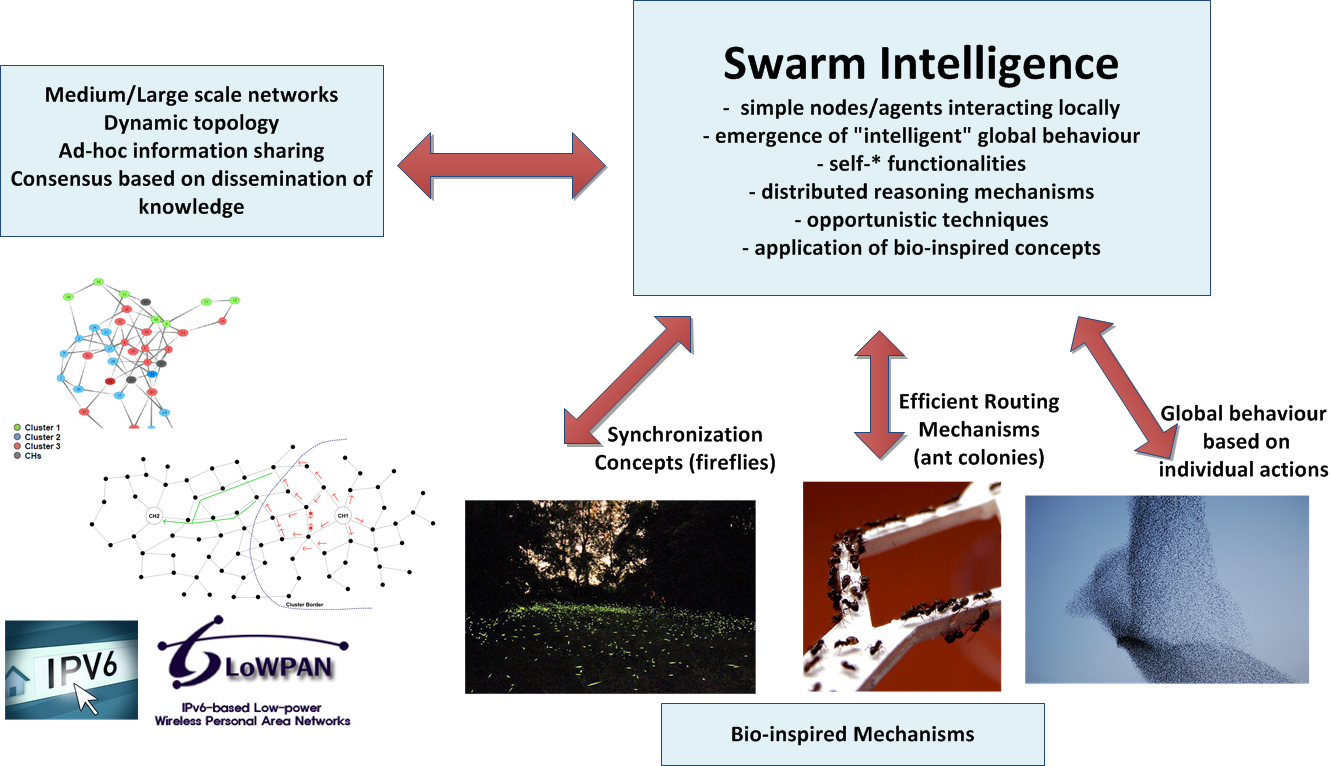ubi:swarm Applying Bio-inspired Techniques in Future Networks
Biologically inspired computing (Bio-inspired computing) is a new scientific discipline that applies biological principles to develop new engineering solutions in the IT era. It is based on the application of existing mechanisms in the nature for the design of advanced self-organized networks/systems, combining knowledge from the fields of biology, computer science and mathematics. Basic principles on their design include the decentralized exchange of knowledge among the participant network nodes/agents, the support of self-* functionalities in the network (e.g. self-organization, self-configuration, self-healing, self-awareness) and the capacity to converge on a stable status as well as a unified way of action upon major changes in the networking environment.
The collective behaviour of decentralized, self-organized, natural or artificial systems (actually systems that usually apply bio-inspired techniques) is defined as Swarm Intelligence (SI). SI systems consist typically of a population of simple nodes/agents interacting locally with one another and with their environment. Interaction among them and proper reasoning based on the available information leads to the emergence of “intelligent” global behaviour, unknown to the individual nodes/agents. Interactions are based on simple behavioural rules that exploit local or network-based information that the individuals exchange directly or via the networking environment. Typical SI systems are composed of many homogeneous nodes/individuals while some type of heterogeneity may be also supported based on specific grouping of nodes according to their capabilities.
UBITECH is actively involved in the design of SI systems, exploiting its expertise in the areas of ad-hoc networking, autonomic networking, distributed systems design and efficient data management. Special focus has been given to the design of SI techniques (ubi:swarm) for the efficient management of large-scale ad-hoc networks (e.g. wireless sensor networks with millions of nodes), taking into account the increased management complexity, their deployment in rough areas in many cases, as well as the need for reduction in the administration and operational overhead. Existing expertise of UBITECH in deploying decentralized autonomous computing infrastructures based on ubi:chord can be proven extremely helpful during the design of ubi:swarm mechanisms. Towards this direction, UBITECH has contributed to the design and development of NEURON, a novel protocol for autonomic deployment, cluster formulation and hierarchical routing in wireless sensor networks.
NEURON is based on ubi:chord and combines the concepts of self-organization, decentralization and optimization in building networking infrastructure. The use of probabilistic techniques combined with decentralized approaches and cooperation among nodes for dissemination of useful information provide reliability, robustness, energy efficiency and scalability in NEURON‘s mechanisms. Energy efficiency is achieved and network lifetime is extended through clustering and hierarchical routing mechanisms. NEURON does not make any assumptions for the location of the sensors, their capabilities and the roles that may undertake. It is designed in order to be stable and scalable and to facilitate the creation of overlay topologies in the sensor network by exploiting routing information stored in the nodes.
It is in UBITECH’s plans to further extend the NEURON’s mechanisms by applying bio-inspired techniques (such as synchronization mechanisms in nature -e.g. bird flocking- and large-groups decision making models) in the field of efficient communication and management of massively distributed systems. Moreover, ubi:swarm mechanisms are going to be developed and applied in diverse application areas. Focus will be given on the design of scalable mechanisms with advance fault-tolerance characteristics, based on the ability to act in a coordinated way without the presence of a coordinator. In cases that it is feasible, computer modelling of biological mechanisms and proper adaptation of biological mechanisms for IT applications will be envisaged.

Main application areas where ubi:swarm solutions will contribute to the evolution of existing management and coordination schemes in future networks applications, include distributed information management systems, dynamic networking environments (e.g. rescue teams with set of nodes that split and merge based on requirements imposed by the provided services), Smart Grid operational and management systems, Internet of Things applications, Sensor Web platforms etc. Furthermore, ubi:swarm solutions may be deployed in the design of operational mechanisms for the management of fleets of copters that carry specific sensors and are remote-controlled hardware. In this case, advanced autonomic networking communication techniques among the copters can be developed for information exchange and synchronization purposes in order to facilitate complex decision making processes. It should be noted that in all the above mentioned cases, characteristics of IPv6 protocol like the advanced auto-configuration, mobility and security mechanisms as well as 6LoWPAN deployments for interconnection of sensor nodes will be exploited.



